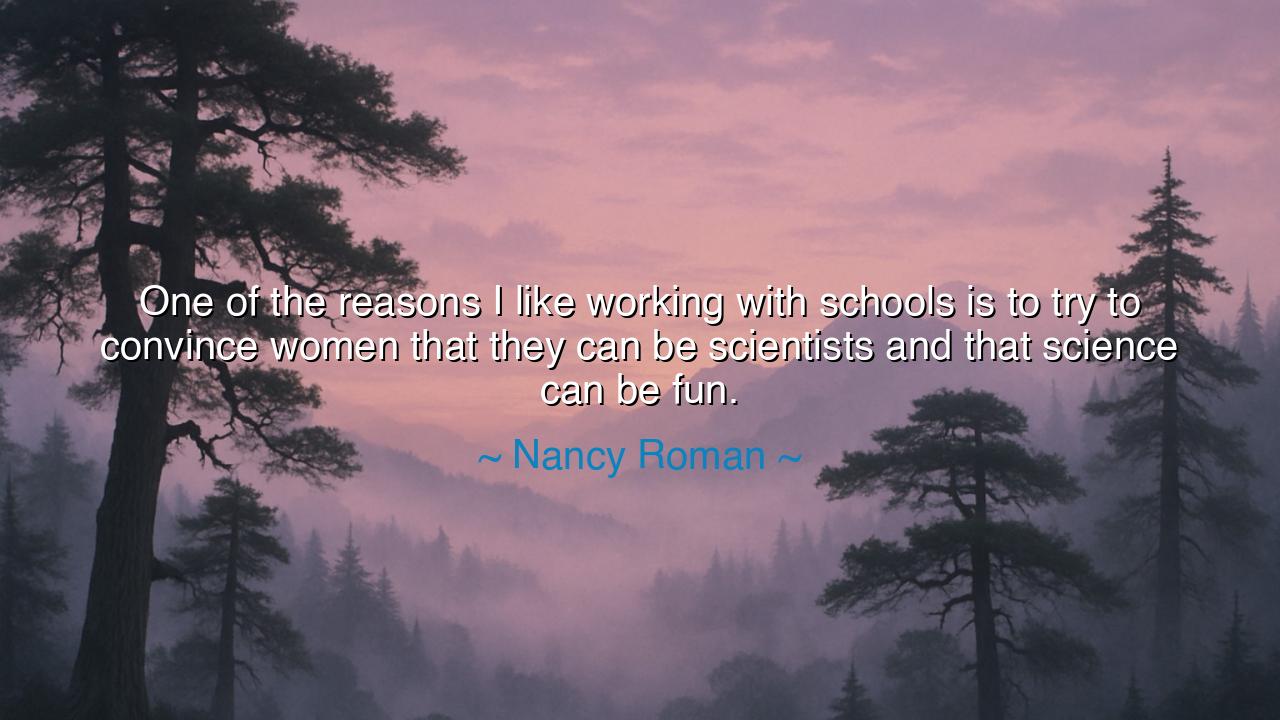
One of the reasons I like working with schools is to try to
One of the reasons I like working with schools is to try to convince women that they can be scientists and that science can be fun.






Hear, O children of the future, for the words of Nancy Roman ring with a message of hope and possibility. "One of the reasons I like working with schools is to try to convince women that they can be scientists and that science can be fun." In these words, she calls to the hearts of all who have been held back by doubt or limitation, especially the women who have long been kept from the sacred realms of science. Through her voice, we hear the echo of a powerful truth: that science is not a realm for the few, the privileged, or the chosen, but a vast and welcoming field where all who have the courage to explore can find themselves. Science, she reminds us, is not dry or unapproachable—it is fun, it is exciting, and it is a journey open to anyone who dares to dream.
In the ancient times, women were often kept away from the halls of knowledge and learning. Hypatia, the great philosopher and mathematician of Alexandria, was a woman who dared to challenge the conventions of her time. She taught philosophy and science to both men and women, believing in the transformative power of knowledge for all. She did not let the barriers of her gender stand in her way, and in doing so, she became a beacon for all those who would follow. Roman’s words carry this same torch of empowerment, lighting the path for women to follow, to show them that science—the study of the natural world, the pursuit of understanding—is open to them, just as it was open to Hypatia.
Consider, O children, the story of Marie Curie, who, in her time, broke through the barriers that society had erected against women in science. With no precedent for a woman to rise to such heights in the scientific community, she not only became the first woman to win a Nobel Prize, but she won it twice—once in physics and once in chemistry. Her work on radioactivity reshaped the very foundation of modern science. Yet, Curie’s greatness lay not just in her intellectual prowess, but in her willingness to forge ahead in a world that told her she could not. Just as Roman seeks to encourage young women to see science as their domain, Curie proved that the realm of scientific discovery was not closed to women; it was open, waiting for them to come forward and take their place.
There is something deeply empowering in the idea that science can be fun. Roman’s vision challenges the notion that science is only for those who are driven solely by the pursuit of knowledge for its own sake. No, she teaches us that science is not a cold and calculating force, but a living, breathing adventure—one filled with curiosity, discovery, and even joy. Think of the wonder that fills the heart of a young person as they look through a telescope for the first time, or as they see the spark of a chemical reaction light up the laboratory. Science is not something to be feared or misunderstood, but something to be embraced with enthusiasm, with a sense of excitement, and with the full joy of exploration. It is not a distant field for the few, but a playground for the mind and the spirit.
Consider, too, the work of Mae Jemison, the first African American woman to travel to space. Jemison, like Roman, worked tirelessly to show the world that space—the very frontier of human exploration—was not a realm closed off to women, or to any group, but was open to all. Jemison has often spoken about how science filled her with wonder, and how she wanted to make sure that young girls, especially girls of color, saw the stars as theirs to explore. Through her work, she gave a face to the idea that science is for everyone, regardless of gender, background, or history. Roman’s call, much like Jemison’s, is one to every young woman who looks toward the heavens and wonders, "Could I be the one to chart a new course, to make a new discovery?"
The lesson that Nancy Roman imparts is clear: science is not a distant, intimidating force—it is a vibrant and exciting path of discovery that anyone can walk. Women, like all people, are equally capable of being great scientists, of transforming the world through their ideas and inventions. The barriers that once held women back are not as strong as they once were, and it is up to each woman to walk boldly into the world of science, to embrace its mysteries, and to see it as a realm full of possibilities, not limitations. It is a journey open to all who are willing to learn, to explore, and to have fun in the process.
O children of the earth, take this wisdom to heart. Do not let the limitations of society or the expectations of others hold you back. Science is for you. It is not confined to any gender, race, or background—it is a universal pursuit that belongs to all who wish to engage with the world in a deeper way. If you have the curiosity to ask questions and the courage to seek answers, then science is your domain. Let it be a source of joy, wonder, and empowerment as you embark on your own journey of discovery. The world is full of mysteries waiting to be unlocked, and you, young seeker, are the key to unlocking them.






AAdministratorAdministrator
Welcome, honored guests. Please leave a comment, we will respond soon